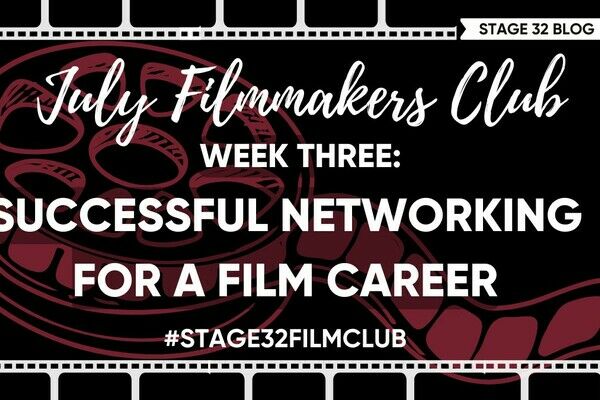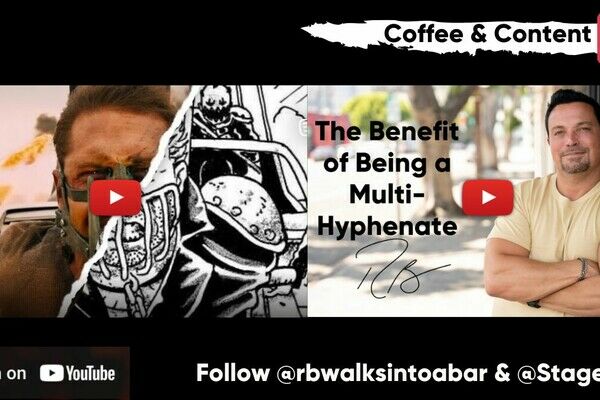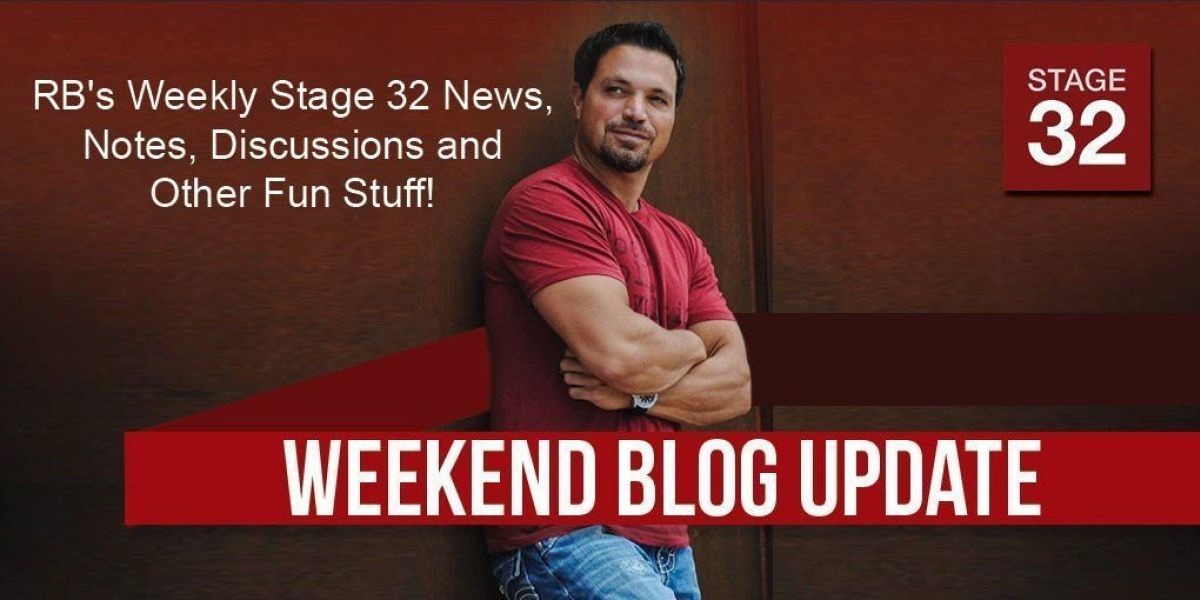Writing Women As A Man
 Richard "RB" Botto
Richard "RB" Botto Today we welcome back guest blogger and screenwriter, CJ Walley. CJ started writing in 2012 and, over an intense two years, has had one script featured on the Amazon Studios Consideration Slate, two features spotlighted on The Black List, and a short produced by an up-and-coming director.
CJ is a remarkably talented writer but, above all, he is a positive and generous spirit – a true collaborator. Day after day you’ll see CJ giving selflessly to the Stage 32 community inside the lounge.
Today, CJ takes us on his journey - and it's one that many writers face - struggling to write female characters. His perspective is one that any writer, director or filmmaker can learn from. I look forward to the discussion.
Enjoy,
RB
I love writing female characters. I’m compelled to, my imagination conjures up women when I dream up scenes, I care more when my protagonists are female, and I feel more emotionally connected when writing about women. But my doctor assures me I’m a man. Perhaps it’s because I’ve befriended and worked with some remarkable women, maybe it’s because I grew up watching some amazing female leads, but either way, it is what it is.
It’s been brought to light recently that movies aren’t doing female characters justice. This is likely down to an embarrassing lack of female directors and writers being given work, and sadly that’s not likely to change dramatically anytime soon. But that doesn’t excuse us amateur male writers from trying harder to give our female characters fairer representation. Female actors need more roles, and those roles need to reflect their talent, not their headshots.
I’m sticking my neck out here, not because I see myself as an authority, an expert, or an opinion leader, but because I care more about improving this area of my writing more than any other. And, on top of that, I strongly feel the conversation must be embraced. I’ve written female characters very badly in the past and continue to struggle. And, while I admit I’m a little scared to bare my soul in this area, I’m prepared to be unveiled as misguided and corrected as foolish because the greater good may not just be better writing, it may be part of a social change for the better, should that writing ever make it to the screen.
So what follows are some thoughts I’m offering to male writers, thoughts that are no way conclusive or comprehensive, but a result of my own personal reflection in a bid to improve.
Men Aren't from Mars, Women Aren't from Venus
We’re both from the same planet and mostly identical. The truth is that character transcends gender. Sadly we tend to play up to our gender expectations and rarely share deeply enough between sexes. Perhaps if we did, we’d come to realize just how much we relate rather than oppose.
Women are quirky, dynamic, and colorful; they can be cocky, arrogant, repressed and overconfident. They are no more emotional than men, nor do they all express emotion externally. Head cheerleaders sometimes never receive Valentines cards and cutthroat female businesswomen can constantly ache for the opportunity to have children. There is no normal, no typical, no standard profile for being a woman.
Yet, as men, we constantly fall victim to defaulting female characters into tropes: the perfect mother, nagging wife, complaining girlfriend, saucy seductress, or broody spinster. We don’t write about the artist, engineer, protector, idealist, or executive who just so happens to be female. We don’t start with personality first and chose the best qualities and traits to make our story interesting. Instead we seem to think, hey this guy needs a wife/girlfriend/affair, she can be the nag/bitch/sex-pot they nearly always are.
Female characters are defined by the true meaning of character, not their gender.
Good Female Characters Are Never One Dimensional
There is a term I’ve grown to dislike; strong female character. I don’t like it because I worry we misunderstand it. Strong does not mean physical strength, nor does it mean qualities like defiance or confidence. We must remember that perseverance, integrity, morality, loyalty, and leadership are tremendous strengths. It’s easy for us to draw the conclusion that, just because our female character kicks ass, they are strong. This leads to us into writing one-dimensional female characters compensated by aggression. The Mary-Sue who chews her lip for ninety pages until she socks a jock in the mouth, the placid wife who dresses someone down with an amusing rant, the exploitation girls that are as tough as they are sexy. It’s uncreative writing that breeds weak female characters lacking in depth.
Female characters are compelling to watch when they are complex, struggling, and broken.
Clarice Starling in Silence Of The Lambs is an ambitious FBI student orphaned as a child and carrying the baggage of a traumatic childhood experience that prevents her sleeping. Bella Swan in Twilight is the shy and hapless new school student, distanced emotionally from her father and geographically from her mother. Characters like these are interesting to watch not only for the strength they grow from, but the weaknesses they struggle to overcome.
I think a good way for us men to understand how it feels is to flip the circumstance and reflect on the male stereotypes that get our manties in a twist. We don’t like it when we see a Prince Charming; we don’t understand the fascination, we don’t feel it’s realistic, we don’t associate with the character because they have little or no traits. We dismiss it as chick-flick trash while remaining ignorant to the fact that, for once, we’re experiencing what women often experience through their portrayal on screen.
One-dimensional female characters are good for one thing, villains. So we need to stop writing them as heroes.
Think Not How Your Women Behave in Your World, but How Your World Behaves around Your Women
While happy to write women as thinking differently, we fail to show how differently women are treated. Somewhat understandable given we don’t experience it directly. But the real world should be realistically presented in our writing. For this I use what I call the Shovel Principle.
Imagine a man and a woman get into an argument where he brutally kills her. In a state of panic, he buys a shovel and buries her body. Now flip it so she kills him, where would the significant difference lie? Does she not brutally kill him? Women kill. Does she choose not to hide the body because she can’t dig a hole deep enough? I know women half my size who could bury me before I bury them. So where’s the difference? It’s when she buys the shovel. It’s how the hardware store Helper jumps to conclusions about her knowledge and needs; how they may talk with a condescending tone; how self-conscious she may feel entering the store and being approached in the first place.
I'm not saying everyone who works in hardware stores are sexist, I’m pointing out we live in a painfully old fashioned world where underlying everyday sexism prevails. But as men we are blasé, we fail to appreciate that, by simply walking down a street, a woman can experience anything from disapproving looks from passers by to misogynist abuse from bystanders. Women are judged significantly; they are objectified and, if they refuse to allow that, they are vilified. Some don’t let it bother them, some shove their hands in their pockets, take a deep breath, and struggle through, some hold their head high and cry alone later.
It’s up to us how we write their reaction, but we can only present society with a balanced understanding and a frank acknowledgement of its flaws.
Women Who Wear Uniforms Still Sometimes Wear Dresses
I write a lot of action, and, as a result, I’ve found a tendency to write female characters as tomboys. I used to think this was flattering until I came to realize I was writing my Sue’s as Bobby’s. While women don’t have to be feminine, they also don’t have to shed their femininity to fill the roles usually associated with male characters. The trap I fell into was subconsciously writing male characters that looked like women. This became further compounded when I over-compensated for my errors by making them hyper-male, the women who can beat up any man, the women who knows more about cars than the next guy and isn’t afraid to let him know it. The reality is that this is patronizing and insulting, it’s cringe worthy faux girl power. This isn’t writing women; this is playing GI Joe with Barbie dolls.
Passive aggressive action women rarely make good characters either; they often make unlikeable characters and are blatantly characterized to appeal to men. One character who optimizes this is Mikaela Banes in Transformers, truly the real robot in disguise. We’re sold Mikaela under the terms that any woman in an action movie must be a boy on the inside and a supermodel on the outside. Another bad example is Gisele in Fast Five who, after being introduced as a highly skilled gun toting mercenary, makes her only significant contribution to the protagonist’s effort, obtaining a handprint, by stripping down to a bikini and getting felt up.
I’m not trying to make out women should not be shown as enjoying typically male things; many women reflect on their childhood and teenage years as showing tomboy tendencies. And many women, while further embracing their femininity as they mature, pursue typically male careers and pastimes. But based on my experience, they often keep that to themselves and dismiss it in front of strangers; because they know that emasculating insecure men is a not a good way to make friends. Just because a woman enjoys golf doesn’t mean she feels the need to strut around in Pringle knitwear and wave a nine iron in the face of every guy she meets. So why do we do it with guns? Why do we do it with martial arts?
The temptation is to compensate the issue with backstory; the girl who was brought up by her father, the woman trying to fill the shoes of her father, the girl trying to avenge her father. These are just methods of turning a female character male and are in danger of being preachy. Much better examples of getting the balance right are Segen in World War Z, Kei in Akira, and Ellen Ripley in Alien. These characters prove their credentials in a matter of fact fashion with actions that have no bearing on their gender or appearance.
Women can be into the same stuff as men, but that’s not a criteria to be an action star, and it certainly doesn’t need to define them as a person. It doesn’t mean they need the mind of a man, it doesn’t mean they need a contrived backstory, and it doesn’t mean they need to be any less feminine.
Women can be action heroes and still be women.
Accept You’re Not Going to Please Everyone
With all that in mind, something I have come to terms with is the wide range of views out there; that what pleases one person can cause issue with another.
For example, I’ve read criticism toward Karin Lane in World War Z for being a weak female character, because she spends the movie waiting for her husband to return from his mission. Personally I thought her being characterized in her introduction as the breadwinner for the family was a positive and rarely seen element in movies. I felt her part of the story was filled with relatable anxiety. I didn’t feel she had to go shout at, punch, or shoot somebody to be more respectable. But some do, so c’est la vie.
And here’s the rub: many audience members are not prepared to move forward, they take comfort in outdated attitudes affirming their view on how reality should be. By embracing a more forward thinking audience, we may have to leave the laggards kicking and screaming behind.
I believe the doctrine to adopt is to show good will and attempt better understanding, to strive to improve with strength behind our own opinion and objective respect for the views of others.
Things I Try to Do
I regularly read interviews by female actors, producers, and directors. They bring a unique perspective to the table, often telling us what they want to see in no uncertain terms. I also make sure to take note of what female writers have to say on forums when the topic of strong female characters comes up.
But mostly I simply listen to the discussion, care about what’s said, and try not to bury my head in the sand. When you open your eyes to it, sexism is everywhere, every day, and it’s sadly often in our scripts.
And the cool thing? If you simply aim for gender equality, that makes you a feminist, and even if you fall short trying, that’s something to truly be proud of.
Like this blog post? Please share it on social media (Facebook, Twitter, LinkedIn, email etc) by using our social media buttons at the top of the blog. Or post to your personal blog and anywhere else you feel appropriate. Thank you.
As always, CJ is available for remarks and questions in the Comments section below!
| Creativity and In-N-Out Burgers! |
| RB's Stage 32 News, Notes, Discussions and Other Fun Stuff (October 17th, 2014) |
Search Stage 32 Blog
There are now 3542 blog posts for you to enjoy. Search them all by tags below.
Acting, Advice, Cinematography, Coffee & Content, Composing, Contests, Distribution, Featured, Filmmaking, Financing, Inspirational, Networking, Producing, Screenwriting, Success Stories, Tips, Trending,Relevant Tags
Recommended Articles

July Filmmakers Club Week 3: Successful Networking For A Film Career

Stage 32 Presents: To Stream or Not to Stream... That is the Distribution Question

The Undeniable Importance of Location Scouting!

Worldwide Premiere of the 9th Annual Stage 32 Short Film Program at The Hollyshorts Film Festival

Coffee & Content: The Secret To Moving The Needle

Coffee & Content: The Benefit of Being a Multi-Hyphenate

Stage 32 Presents: Meet the Producers from this Year’s Cannes In-Competition Films!

15 Powerful Tips to Embrace Abundance in Your Creative Journey

Stage 32 Presents: State of the Industry- Post-Strike Dealmaking for Actors & Writers





